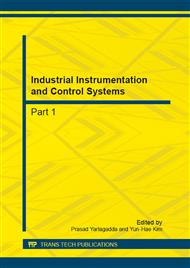p.2307
p.2312
p.2316
p.2323
p.2327
p.2331
p.2335
p.2343
p.2350
A Metropolis Criterion Based Fuzzy Q-Learning Flow Controller for High-Speed Networks
Abstract:
For the congestion problems in high-speed networks, a Metropolis criterion based fuzzy Q-learning flow controller is proposed. Because of the uncertainties and highly time-varying, it is not easy to accurately obtain the complete information. In this case, the Q-learning, which is independent of mathematic model, and prior-knowledge, has good performance. The fuzzy inference and Metropolis criterion are introduced in order to facilitate generalization in large state space and balance exploration and exploitation in action selection individually. Simulation results show that the controller can learn to take the best action to regulate source flow with the features of high throughput and low packet loss ratio, and can avoid the occurrence of congestion effectively.
Info:
Periodical:
Pages:
2327-2330
Citation:
Online since:
December 2012
Authors:
Price:
Сopyright:
© 2013 Trans Tech Publications Ltd. All Rights Reserved
Share:
Citation:


